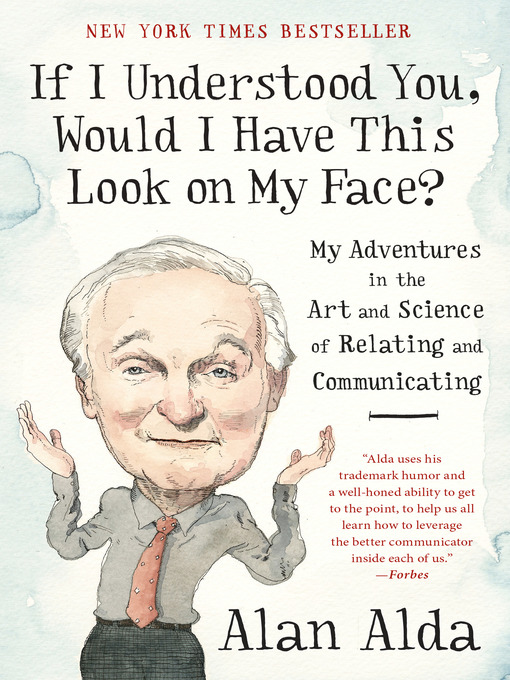
If I Understood You, Would I Have This Look on My Face?
My Adventures in the Art and Science of Relating and Communicating
کتاب های مرتبط
- اطلاعات
- نقد و بررسی
- دیدگاه کاربران
نقد و بررسی

April 3, 2017
Veteran actor and director Alda (Things I Overheard While Talking to Myself) turns his attention to the world of social science in this breezy overview of work conducted at the Alan Alda Center for Communicating Science at Stony Brook University in New York. Citing the center’s research, he explains how improvisational games, empathy exercises, and storytelling tools can help anyone get better at communicating, listening, and relating everywhere “from the boardroom to the bedroom.” Though widely associated with his role on the TV show MASH, Alda also hosted Scientific American Frontiers on PBS for 11 years, and he writes as enthusiastically about his experience with educational programming as he does about the scientists who teach the art of empathy to autistic children and medical doctors, among other subjects. Readers expecting healthy doses of Alda’s signature dry wit, however, might be disappointed. Other than a riff about his dentist and the occasional throwaway joke, he’s all business here. Agent: Amanda Urban, ICM.

April 1, 2017
A distinguished actor and communication expert shows how to avoid "the snags of misunderstanding" that plague verbal interactions between human beings.When Alda (Things I Overhead While Talking to Myself, 2007, etc.) first began hosting the PBS series Scientific American Frontiers in 1993, he had no idea how much the job would change his life. In the 20 years that followed, he developed an enduring fascination with "trying to figure out what makes communication work." As a TV show host who interviewed scientists and engineers, Alda became painfully aware of his own shortcomings as a communicator and how his background as an actor could help him improve. In the first section of the book, he discusses how effective communication requires listening with ears, eyes, and feelings wide open. Drawing from research, interactions with science professionals, and his work as an actor, Alda reveals how individuals who aren't "naturally good" communicators can learn to become more adept by practicing their overall relating skills. He describes activities like the "mirror exercise," in which partners observe and mimic each other's actions and speech. Not only do people learn how to focus on each other, but they also "strengthen cohesion and promote cooperation" in groups. In the second section, Alda, who founded the Alan Alda Center for Communicating Science at Stony Brook University, points out the importance of empathy in communication. He discusses, among others, an exercise that forced him to name the feelings he saw others express. Raising awareness of emotion increases empathy levels, which can trigger the release of oxytocin, the feel-good "love hormone." By adding emotion to communication, using storytelling, avoiding jargon, and eliminating the assumption that others share the same knowledge base, message senders can forge closer bonds with recipients. The book's major strength comes from Alda's choice to take an interprofessional approach and avoid offering prescriptive methods to enhance interpersonal understanding. As he writes, communication "is a dance we learn by trusting ourselves to take the leap, not by mechanically following a set of rules." A sharp and informative guide to communication.
COPYRIGHT(2017) Kirkus Reviews, ALL RIGHTS RESERVED.

May 1, 2017
Today, we have more ways to communicate than ever before, but how well are we actually communicating? As founder of the Alan Alda Center for Communicating Science at Stony Brook University, the beloved actor and author helps researchers learn essential skills that can help them communicate their work to a wider audience. The center also trains health-care professionals, with the aim of improving their relationships with patients. It's not only scientific concepts that need clarification; the content of our daily lives can be better expressed and understood. Alda utilizes methods that he has learned at the center and through his work as an actor to explore how we can become better listeners and communicators. Drawing on a range of scientific and social science research, as well as his work in improvisation and directing, Alda outlines the steps and missteps in relating to other people in productive, meaningful ways. VERDICT Alda brings a distinct perspective with his trademark warmth and humor. As he addresses current popular themes in general nonfiction, readers can imagine his voice and expressions in recounting his experiences, making this book's content even more welcoming.--Meagan Storey, Virginia Beach
Copyright 2017 Library Journal, LLC Used with permission.

May 1, 2017
Alda, known for his acting in shows like M*A*S*H and The West Wing, has been exploring his deep interest in the sciences for the last several decades, as the host of Scientific American Frontiers (which ended its 12-year run in 2015) and as the founder of the Alan Alda Center for Communicating Science, at Stony Brook University. It is his work with the latter that Alda draws on, although this inquiry was in part inspired by his work with the series. Alda noticed when speaking with scientists that often their explanations went way over laypeople's heads; conversely, when he started his work on Scientific American Frontiers, his assumptions about his own knowledge hindered his dialogue with experts. Alda lays out how improv techniques such as mirroring can help improve communications skills, and he stresses how important active listening is to a successful conversation. He goes on to illustrate how essential these skills are in all walks of life, from motivating employees to reaching autistic children. This is an enlightening and thoughtful combination of shared experience and advice.(Reprinted with permission of Booklist, copyright 2017, American Library Association.)

























دیدگاه کاربران